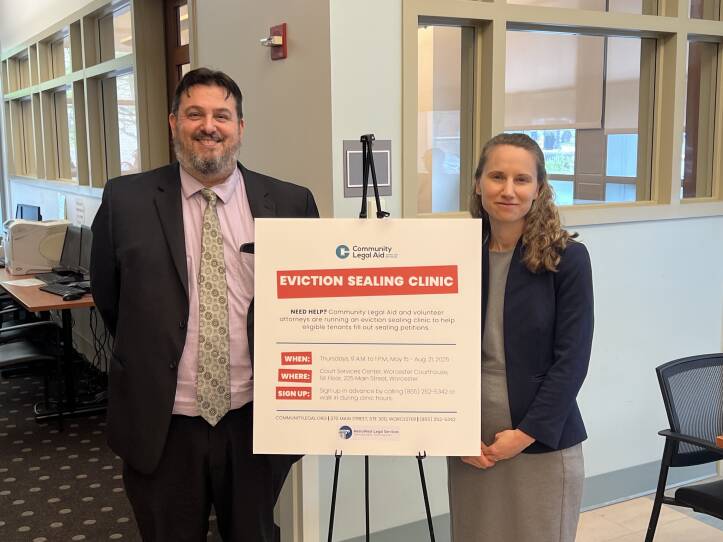For nearly two years, Tina Baygboe and her son and daughter have lived at her mother’s small apartment in Worcester.
Baygboe, whose children are both under the age of 10, wishes she had her own place. She knows she can afford the rent and upfront fees of apartments she’s come across online. But she’s applied to seven different listings and keeps receiving the same response from landlords: They won’t accept her because of old eviction cases on her record.
“My daughter needs her own room, and I shouldn’t be sleeping on a couch,” she said. “I’ve been praying for something to happen.”
When a social worker told Baygboe about a new Massachusetts law that lets tenants clear their eviction records, she started to cry from relief.
Earlier this month, she was among just over a dozen people who attended a legal clinic at Worcester’s courthouse meant to help tenants take advantage of the law. Housing attorneys with Community Legal Aid and MetroWest Legal Services reviewed each tenant’s eviction history and helped them complete paperwork needed to submit a court petition to seal their records.
According to Housing Court data, there have consistently been more than 2,000 new eviction cases filed in court every month since late 2022. Blair Komar Bates, a senior supervising attorney with Community Legal Aid, noted that traditionally, all eviction cases have remained on people’s records, even if tenants did nothing wrong to warrant the filing and the case was eventually settled or dismissed by a judge.
Since landlords, employers and credit agencies can view people’s court records online, Komar Bates said the eviction histories have proved to be major barriers for people trying to secure jobs, loans and housing. They’re especially detrimental amid Massachusetts’ housing crisis and rising rates of homelessness.
“I have been practicing landlord-tenant law in the Central Housing Court for about 10 years,” she said. “I can say almost every one of my clients has been harmed by having evictions on their record.”
According to the new law — which took effect May 5 — prior eviction cases that have been already dismissed by a judge can be sealed immediately. The Housing Court will also clear an eviction quickly if it was no-fault — meaning the landlord simply wanted the tenant to move out.
However, if a landlord filed an eviction because the renter violated the terms of the lease, the tenant has to wait seven years before the case can be sealed. A renter also may have to wait four years if the eviction was due to them not paying rent and that debt remains outstanding.

During the Worcester clinic, attorneys explained the law’s criteria.
David Brown with Community Legal Aid told Lizdeliz Cochran that one of the evictions on her record stemmed from her falling behind on rent. But because she’s since paid the landlord what she owed, the court should soon grant her request to seal the eviction.
Another eviction case in 2018 was due to her violating terms of the lease when she missed a couple electricity bill payments. For that one, Cochran needs to wait four more months before she can meet the seven-year wait period to have it sealed.
“[It was] the first time I had an apartment,” she told GBH News, regarding the missed payments. “I was really dumb and young and a first-time mom. I was struggling.”
Cochran now lives in a shelter for women who are victims of domestic violence. She said she plans on moving into her own apartment, but knows an eviction “makes it a hundred times harder to try to move forward.” After hearing about the eviction sealing workshop at her shelter, Cochran knew she had to attend.
“It was actually pretty fast … the lawyer was great,” she said after leaving the clinic and handing her request to seal the records to the Housing Court clerk.
About the law
At Housing Court, tenants can request their eviction record be sealed quickly if the case was a no-fault eviction, already dismissed by a judge, or if they pay any owed rent.
Tenants must wait four years if the eviction was due to nonpayment of rent and the debt remains outstanding, or seven years if the eviction was due to lease violation.
Tina Baygboe, the woman who’s been staying at her mom’s, learned that two of her evictions from over 20 years ago could be removed immediately. A third eviction filing from 2023 was due to missing some rent payments as she looked for a new job. But if she pays the landlord back the owed rent, that record could be sealed as well.
“I actually have the money today to make the payment,” she said. “I’m very thankful, and I’m hopeful.”
In addition to allowing the Massachusetts Housing Court to clear eviction histories, the new law blocks credit reporting agencies from including evictions in their reports.
Critics have argued it takes away an effective tool landlords use to screen prospective tenants. But Komar Bates countered the law’s eligibility requirements ensure that people still face a penalty for violating a lease or not making rent. She added that at some point, renters need to be forgiven and be able to move on. Landlords can rely on other tools, like credit and income checks, to vet applicants.
The attorneys with Community Legal Aid and MetroWest Legal Services will host the eviction sealing clinic every Thursday through at least late August. Community Legal Aid also plans to start holding a separate workshop once a month in Fitchburg, in partnership with the local nonprofit Making Opportunity Count.
Komar Bates said a concern going forward is that many residents may not learn about the new law. The legal agencies are therefore collaborating with other community organizations to notify people. Housing Court judges can also inform renters who come into courtrooms to fight evictions.
The state’s housing website already includes a survey meant to help people file petitions to seal their records.
“We want to have more tenants sign up,” she said. “It’s increasingly important that tenants have a fair shake at finding an apartment.”





